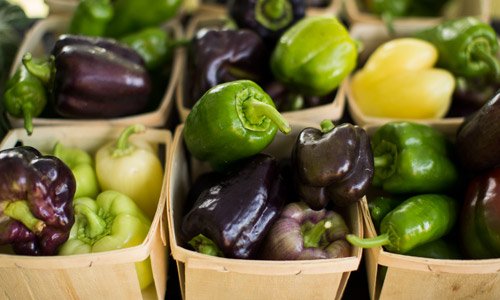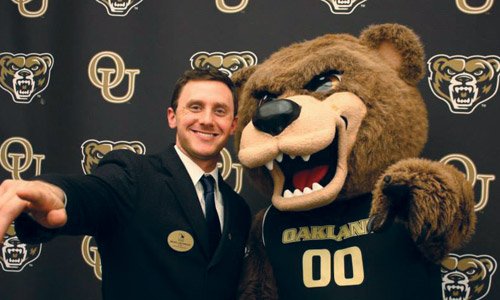Alumni
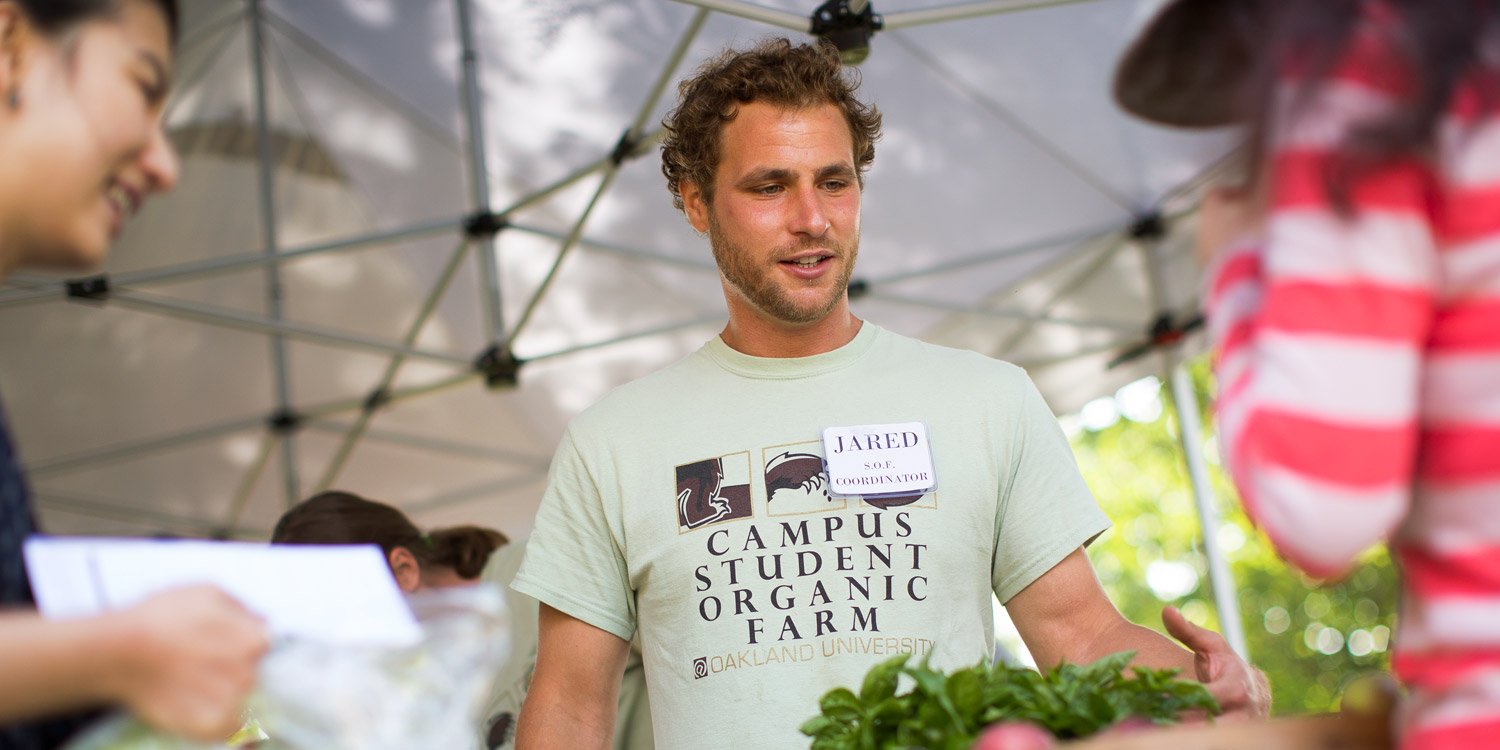
Jared Bogdanov-Hanna, CAS ’08, works the campus farm stand, one of his responsibilities as coordinator of the University’s Organic Farm.
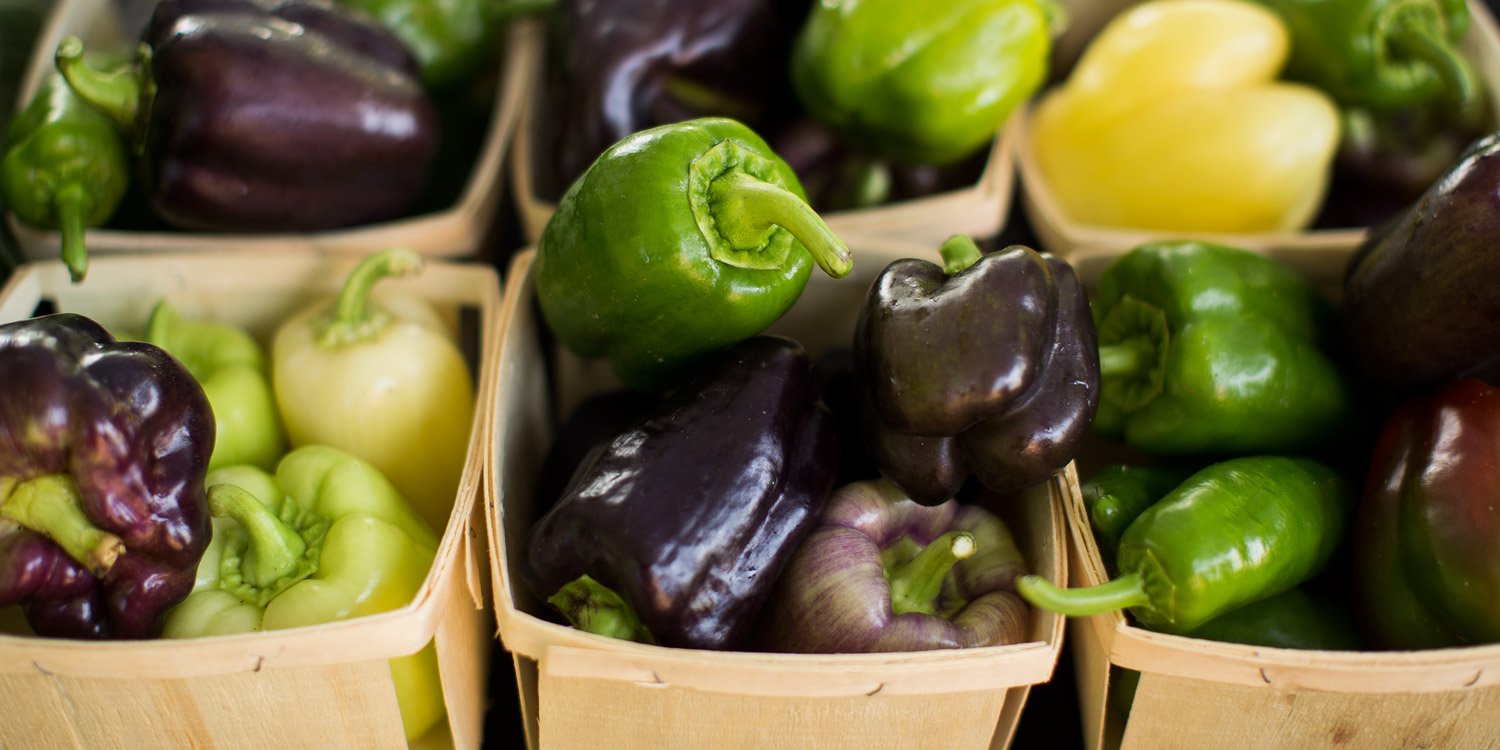
Varieties of organic peppers sold on campus at the Organic Farm stand.
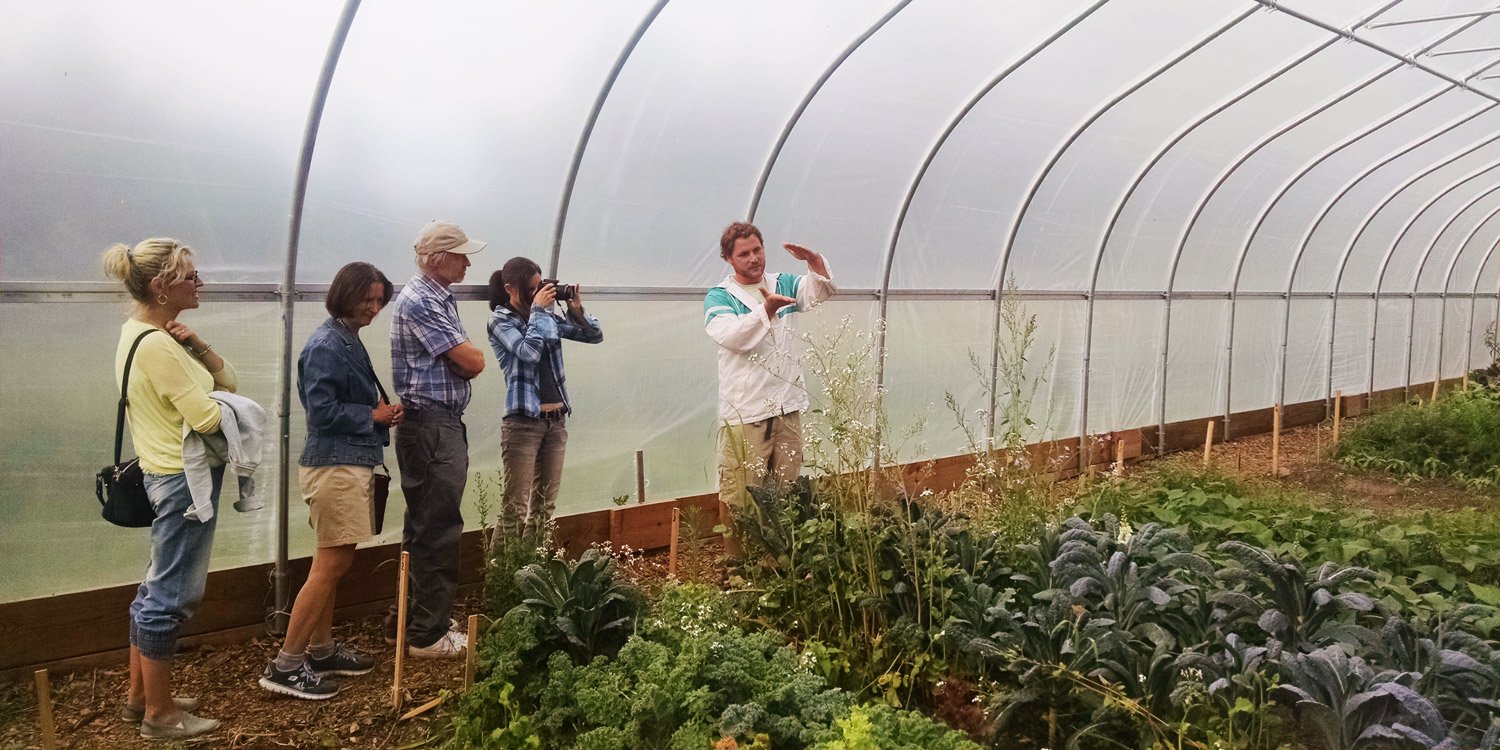
Hanna answers gardeners’ questions during a hoop house tour at the farm’s annual Summer Solstice Potluck.
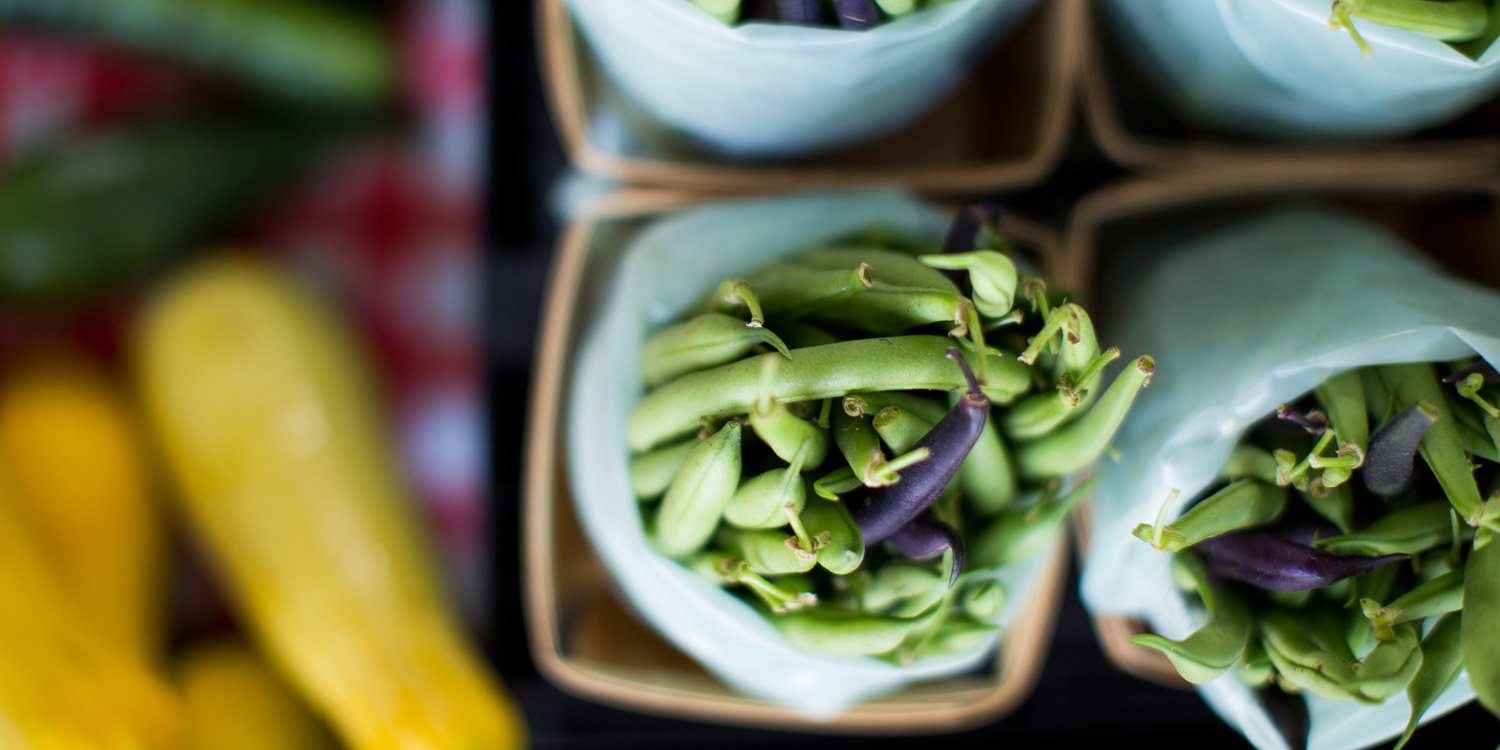
Organic bean varieties on sale at the campus farm stand on Thursdays.
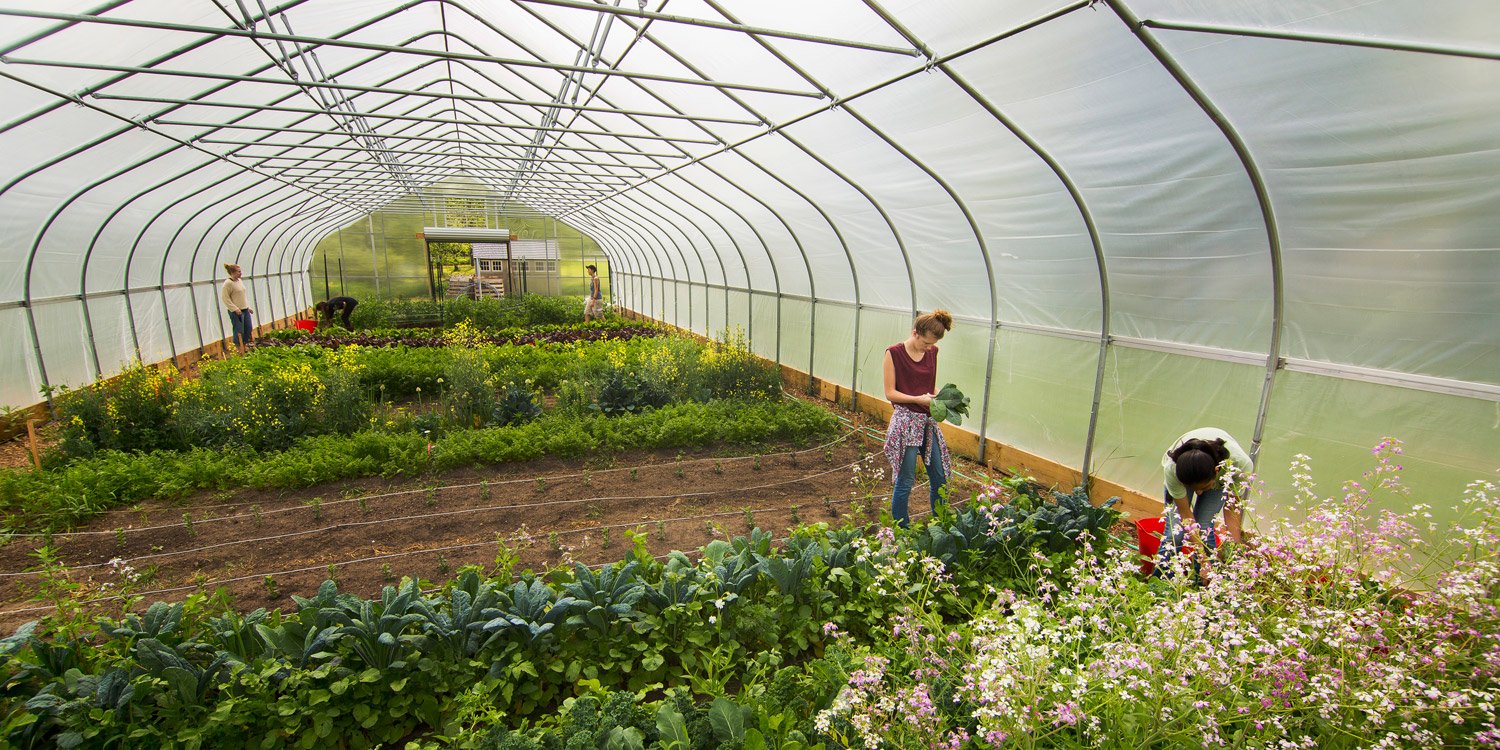
The farm’s hoop house allows for year-round harvests.
Alumni
Winter 2016
| by Rene Wisely
PLANTED
Alum finds his path organically and becomes the teacher.
Jared Bogdanov-Hanna, CAS ’08, cultivated his mind and then the soil at Oakland University. When he graduated with a major in Psychology, he had more questions about how food and nutrition made an impact on a person’s overall health, mental well-being and cognition.
These sent him on a journey of self-education. Hanna immersed himself in Michigan’s organic farming, gardening and sustainability community, attending conferences and classes, earning an internationally recognized certificate in permaculture design, and then planting an edible forest on a quarter acre in the shadow of the Somerset Collection, the upscale mall in Troy, Michigan.
Today, his two passions meet in a hoop house and half-acre farm in the southeast corner of campus property, at Butler and Adams roads.
Hanna is Oakland University’s Organic Farm coordinator, plotting, planning and working the Campus Student Organic Farm. He sets up a farm stand and organizes volunteers to sell the produce and flowers. He mentors the Student Organic Farmers Club and, as a special lecturer in the Department of Biological Sciences, teaches Fundamentals of Organic Farming and Permaculture: Theory and Practice. These hands-on courses include labs open to students in any major.
“He was my top candidate when I had a chance to hire him,” said Dr. Fay Hansen, associate professor of Biological Sciences and founder of the OU organic farm.
She met Hanna when he was a student volunteering to help with the harvest. They got to know each other more while working on such community gardens as HAVEN in Pontiac, and at Tall Trees Community Farm in White Lake, Michigan.
“He’s a go-getter, self-directed and very much a Renaissance man.”
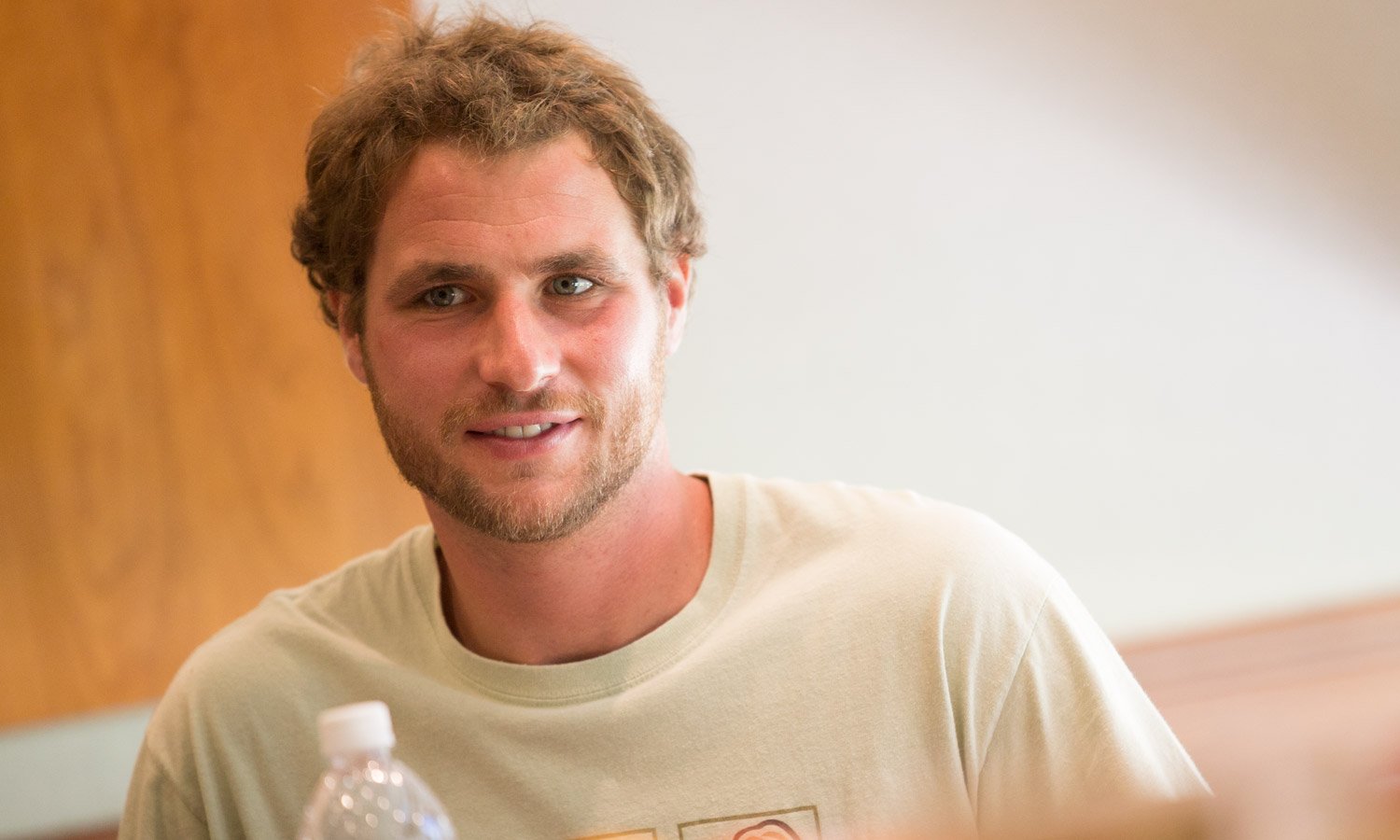 |
| Hanna, his sister and a group of farmers around the state founded the Michigan Young Farmer Coalition to bring young farmers and gardeners together to cooperate on future demands on Michigan’s food system. |
Hanna, his sister, Alexis, and a group of farmers around the state founded the Michigan Young Farmer Coalition in 2009. The statewide organization brings young farmers and gardeners together to cooperate on future demands on Michigan’s food system. Other states have copied Hanna’s group and formed a national organization.
Hanna’s organic and permaculture expertise was quickly recognized across the state, putting the Oakland Student Organic Farm on the map.
“Many people come out and seek us, but a lot of people see our garden, our flowers, our fences and stop by,” Hanna said. “We are happy to be an ambassador to the University.”
Dr. Hansen also was impressed with Hanna’s ability to turn his curiosity about gardening, healthy eating and permaculture ― the development of agricultural ecosystems that are sustainable and self-sufficient ― into a business.
“People were asking me so many questions when it came to their gardens that they wanted to pay me for consulting, so I began my own business,” Hanna said.
In 2010, he and his sister launched Abundant Succession, LLC, a regenerative design firm, in Troy.
His organic interest peaked at an opportune time, as more growers and consumers adopt organic farming. According to the Michigan Organic Food and Farm Alliance (MOFFA) and the USDA, Michigan currently has 457 certified organic farms.
Oakland fills an import niche in the organic scene, Hanna said. “We’re not necessarily an agriculture school training students to be farmers; we are showing professionals like doctors, teachers and finance majors how they can apply this to their lives.”
While many use the training for their personal health and well-being, one former volunteer in medical school has decided to focus on food and nutrition as a basis for preventive health care.
“Now that I’ve been doing this for six years, I hear back from students about how they are using their knowledge and it’s nice to make an impact on their lives,” Hanna said.
Karen Lloyd, associate director of OU’s Office of Public School Academies, is a regular customer at the campus farm stand, where cucumbers, kale, green beans, potatoes and tomatoes harvested by Hanna and his team are for sale each week.
“Jared’s been an anchor for that farm,” Lloyd said. “Over the years I’ve seen new groups of students at the stand. Each group is so enthusiastic, and that tells me Jared has a way with people. He ignites a fire in them and that makes the vegetables taste even better because I like the people involved.”
Dr. Hansen agrees.
“He’s is such a good role model. Many leave wanting to be Jared.”
Rene Wisely is a freelance writer from West Bloomfield, Michigan.
Planting the seeds
Jared Bogdanov-Hanna grew up on eight acres in Troy, where his family homestead included a large garden, chickens, goats and ducks.
“I had daily chores that included weeding, feeding the animals and harvesting eggs,” said Hanna, explaining where he first experienced the gardening bug.
In 2007, he replaced the family’s old chicken yard by building a small hoop house. By the spring of 2008, after graduating from Oakland University, he started planting in the old pasture. Year by year, the garden grew to a quarter-acre of edible forest.
Now it has more than 100 species of vegetables, fruit trees, flowers and herbs that he actively maintains as “an ecosystem that mimics old field mosaics and early woodlands.”
His handiwork is now a must-see destination for garden enthusiasts, and is a field trip stop for students in his Fundamentals of Organic Farming and Permaculture: Theory and Practice classes.
“I brought my cousin who was visiting from Russia here and she started crying when she saw
the edible forest,” Hanna said. “She told me my grandpa had created something similar, and I
had no idea.”
He had found the original seed of his love of gardening.
Organic Lingo
Gardening has its own vocabulary. Here are a few words that Jared Bogdanov-Hanna uses in his everyday life and their meaning:
Sustainable: To maintain indefinitely, without compromising the future.
Organic gardening/farming: The development of an agricultural ecosystem that is sustainable or improves biological and other resources.
Hoop house: A temporary structure covered in plastic that resembles a greenhouse, but uses no additional energy for year-round harvests.
Permaculture: An ecologically based design system for developing integrated, economically viable and ecologically sound healthy human habitats.
Regenerative design: To improve or restore to a more favorable state, where the actions of that system improve the elements within it and even outside of it.
Source: Jared Bogdanov-Hanna
Videos
Learn to Grow: https://youtu.be/hkUm1M2Ba9M
Student Organic Farmers at OU: https://youtu.be/eLYrZndTzXABy
